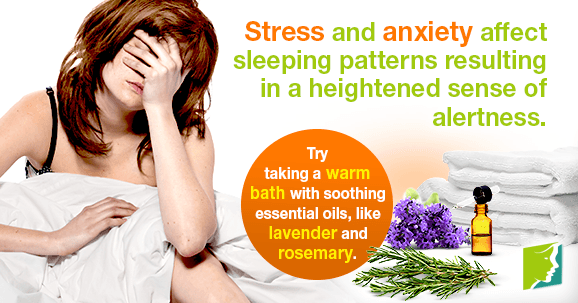One out of three people report experiencing persistent stress and anxiety on a daily basis. Stress and anxiety are directly linked to sleep problems. Women are significantly more likely to experience sleep problems than men. This is mostly due to hormonal fluctuations women experience after puberty - particularly during menstruation, pregnancy, and menopause. Stress and anxiety affect your sleeping patterns because they cause a heightened sense of alertness. This article focuses on the causes of this problem, as well as several helpful tips for getting a good night's rest.
How Stress and Anxiety Affect Sleep
Stress is defined as a response to a threatening situation. In excess, stress can impact your health, causing symptoms like headaches and insomnia. Anxiety is described as a psychological state that is characterized by overwhelming feelings of nervousness, worry, and tension.
Stress and anxiety can be beneficial in small doses because they act as a survival instinct, allowing you to be incredibly aware of your surroundings. As previously stated, stress and anxiety directly affect sleeping patterns because of the heightened sense of alertness and fear they cause in the nervous system. It makes it difficult for your body to relax, both mentally and physically.
A report commissioned by the Anxiety and Depression Association of America found that 8 out of 10 adults have experienced some type of sleep-related difficulty that was linked to stress and anxiety. Insomnia - which is a sleep disorder that is characterized by the difficulty falling and staying asleep - is a common symptom of anxiety and stress. It then becomes a vicious cycle because the lack of sleep leads to more stress and anxiety about daily tasks and the inability to focus.
Sleep Tips
It is important to try to manage stress and anxiety in order to get a good night's sleep. Exercising regularly can be very beneficial in reducing stress, improving sleep, and increasing energy throughout the day. The general recommendation is getting at least 30 minutes of aerobic activity per day, or at least five times a week.
Eating healthy can affect your overall well-being and ability to focus. Try to incorporate plenty of fruits and vegetables, fiber, protein, and good fats into your daily diet. In addition to these lifestyle changes, it is important to try and get at least seven to eight hours of sleep per night.
Establishing bedtime rules like a regular bedtime and taking time to relax and unwind before bed can be useful. Try taking a warm bath with soothing essential oils, like lavender and rosemary. Avoid using computers, phones, and televisions before bed as well. The bright screens cause the eyes to be aroused, making it harder to fall asleep.
Stress and anxiety are common psychological disorders that can affect sleeping patterns, as well as the ability to carry out everyday tasks. It is important to try to manage these disorders. Getting regular exercise and eating healthy can be beneficial, but it is also important to seek professional help if symptoms persist or worsen. Talk therapy and prescription medications can be helpful in managing stress and anxiety.
Sources
- Anxiety and Depression Association of America. (2014). Stress and Anxiety Interfere with Sleep. Retrieved September 22, 2014, from http://www.adaa.org/understanding-anxiety/related-illnesses/other-related-conditions/stress/stress-and-anxiety-interfere
- National Institute of Mental Health. (n.d.). Anxiety Disorders. Retrieved September 22, 2014, from http://www.nimh.nih.gov/health/publications/anxiety-disorders/index.shtml
- Staner, L. (2003). Sleep and anxiety disorders. Dialogues in Clinical Neuroscience, 5(3), 249-258. Retrieved from http://www.ncbi.nlm.nih.gov/pmc/articles/PMC3181635/




